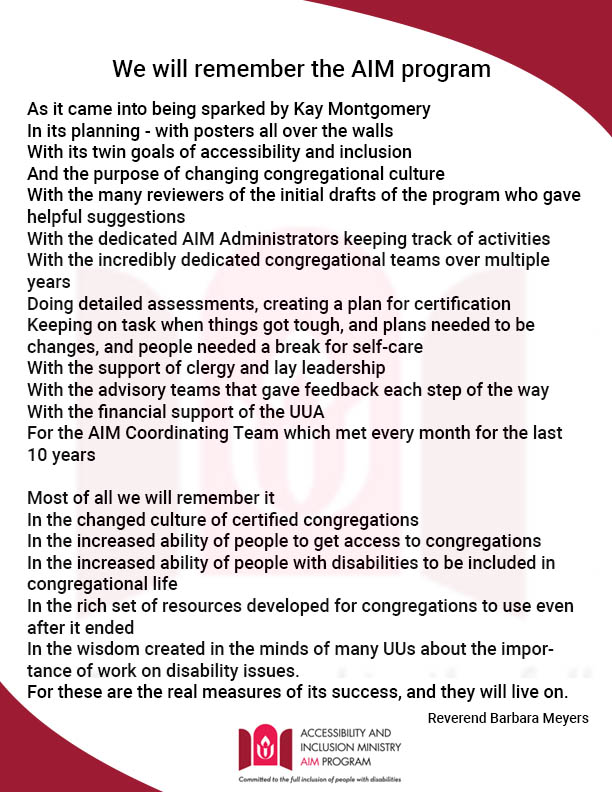
5.8.22 AIM Program Announcement:
Over the past year, the Accessibility and Inclusion Ministry (AIM) Program has been in a process of re-assessment and has not been accepting new applications.
Due to the small number of congregations that have joined the program and even smaller number of congregations that have certified, we have come to accept that a multi-year congregational certification program is not the best way to advance the work of anti-ableism in Unitarian Universalism, nor the best use of our volunteer resources, at this moment in time.
We have made the difficult decision to end the certification program for congregations. We are making arrangements to continue to support congregations currently in the Program.
We would like to express our appreciation to everyone who has been a part of AIM over the ten years since we began the work. Those readers who helped with the early drafts, those who served on the advisory teams, the congregations who participated, and, most especially, the local teams who led the work in their congregations. Thank you.
We are glad to say that the Unitarian Universalist Association is committing, in principle, that the work of supporting congregations around accessibility and inclusion is rightly and properly the UUA’s work to do. We expect the framework of that support will take time to develop and that it will evolve. We know that, in the short term at least, the approach will not be a congregational certification program. We believe that, outside the formal structure of a certification program, increased flexibility will make it easier for more congregations to engage in disability work, thereby benefiting more disabled UUs.
In the meantime, there are projects on accessibility and dismantling ableism that members of congregations can be working on right now. These are projects that can help congregations live into our UU anti-oppression values. These projects can be found by clicking here. Over time, we may also make some other resources developed for the AIM Program available on the EqUUal Access website and/or through the UUA website.
As the UUA takes up the work of supporting congregations around access and inclusion, EqUUal Access is imagining new ways of building community among disabled UUs and new approaches to our continuing work of anti-ableism advocacy and disability justice education in our faith tradition.
With deep appreciation for all who have served in the Program, sincerely,
The Accessibility and Inclusion Ministry Coordinating Committee
Joint statement from EqUUal Access and the Unitarian Universalist Association on the Accessibility and Inclusion Ministry (AIM) Program and development of a Memorandum of Understanding
June 8, 2022
EqUUal Access and the Unitarian Universalist Association (UUA) support the decision by the Accessibility and Inclusion Ministry (AIM) Coordinating Committee to wind down the AIM certification program. This will allow the resources which currently support the program to be redirected towards more high-impact ways of advancing accessibility and countering ableism.
The AIM Program began as a collaboration between EqUUal Access and the UUA in 2012. Now, the two organizations are working on a full memorandum of understanding to define and solidify their cooperation and support towards the same goals which led to the AIM program’s creation over a decade ago. With increased funding from the UUA, this agreement will support the community of disabled UUs through EqUUal Access, provide for accessibility resources for congregations through the UUA, and commit UUs to working towards disability justice in activism and organizing.
Together, the UUA and EqUUal Access thank the volunteers and professionals who have supported the AIM program over the years. They extend their appreciation to all the congregations who have engaged with the program. And they jointly commit to advancing accessibility, inclusion and anti-ableism in new ways in the years ahead.

